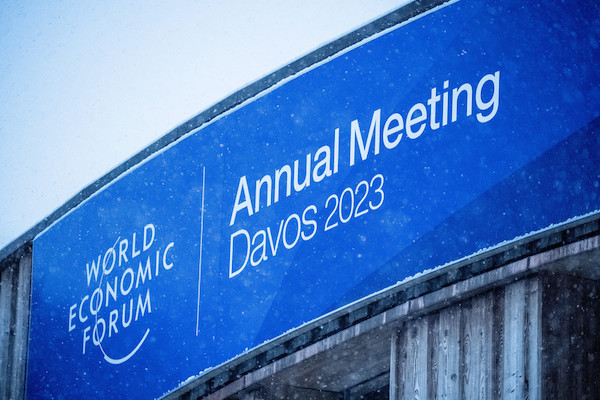Published on the 26/01/2023 | Written by Heather Wright

From a ‘purpose driven metaverse’ to clean data, 5G and quantum…
A purpose-driven metaverse where organisations can get together and learn about and create solutions for the world’s most pressing issues was among the headline tech acts at Davos 2023, where business leaders and politicians grappled with both the potential and the pitfalls of technology – albeit often at a less than practical level businesses.
Technology was a topic for both optimism and concern at the event last week. More than 100 tech-focused sessions were held, covering topics from strengthening cyber resilience in the oil and gas industry, to an alliance to accelerate digital inclusion in critical sectors and removing trade barriers through ‘tradetech’.
“I think that is going to be the next computing platform and eventually it is going to be as big as phones.”
The conference came amidst news of layoffs of tens of thousands of tech employees at major IT companies, and concerns about technology were on show throughout, with talk around a lack of technology strategy investment and the potential for a ‘catastrophic’ cyberattack in the next two years in the wake of geopolitical instability.
But tech was also showcased for its potential to help solve many of the world’s biggest problems.
The working prototype of the Global Collaboration Village, a collaboration between the World Economic Forum, Microsoft and Accenture was unveiled at the conference as one of the kickoff events.
Klaus Schwab, World Economic Forum founder and executive chairman, says the village will use ‘the frontier capabilities of the metaverse to find solutions for addressing the big issues of our time in a more open, inclusive and sustained way’.
“With the Global Collaboration Village, we are creating the first public purpose-oriented application of the metaverse technology, building a true global village in the virtual space,” Schwab says.
Eighty organisations, ranging from tech companies including SAP, HPE, IBM, Infosys, Salesforce, NEC and PayPal to the American Heart Association, the World Trade Organisation, International Committee of the Red Cross, Interpol, the London Stock Exchange and consulting firms including Bain & Company, Capgemini, EY and PwC.
The village includes a town hall for future sessions and meetings, collaborative centres where participants can ‘deep dive’ into collaboration, experiential learning and real-world impact on global issues; and stakeholder campuses.
Attendees at a panel on Technology for a More Resilient World heard that technology can be a critical tool in the transition to a cleaner, safer and more inclusive world. The session saw a focus on the metaverse (again!), along with quantum computing, 5G networks and digital twins, with boosting productivity a key focus for businesses.
Cristiano Amon, Qualcomm president and CEO, says he expects ‘significant’ progress in those areas in the next 10 years – and he’s tipping a big future for smart glasses.
“The technology trend is the merging of physical and digital spaces,” Amon says.
“There are digital twins of everything – enterprises, people. How do you merge that together? I think that is going to be the next computing platform and eventually it is going to be as big as phones. And we should think about that happening within the decade,” he says, adding that Qualcomm has been investing in VR, AR and the metaverse.
Arvind Krishna, chairman and CEO of IBM, meanwhile was pushing quantum computing. He says while it won’t replace classical computing – “You’re not going to run your bank balance on a quantum computer because a quantum computer may give you a different answer each time and for some things you likely want the same answer,” he quipped – it will begin to solve problems in the physical world such as materials, chemistry, encryption and optimisation problems, within a few years.
Sunil Bharti Mittal, chairman of Indian multinational Bharti Enterprises, which operates across manufacturing, telecommunications, agribusiness, real estate, hospitality, agri and food, noted that while use cases in 5G are currently limited, the technology hold potential across many areas.
“It can give you low latency that has never been imagined before, and that creates a lot of use cases – drone management, robotic surgery, autonomous vehicles – a lot of things people have never imagined before.
“But where the most benefit will come out of 5G is industrial applications.”
However, he cautioned that 5G will cost ‘a lot of money for the entire telecom industry’.
“There’s another capability of 5G that is different to the other G’s – it will democratise computing power,” Amon adds.”You will have the ability to have computing power on demand running workloads on the cloud and that’s going to be very different. That allows basically every device that is 5G to tap into as much computing power as you need and that’s going to be very instrumental when we think about some of the new use cases.”
Also garnering plenty of attention was ChatGPT, which this week received an additional US$10 billion in funding from Microsoft, and proved a hot topic for executives and policy makers at Davos, with a panel devoted to the potential and pitfalls of generative AI.
Horoaki Kitano, CEO of Sony Computer Science Laboratories and a panelist on the Generative AI session, says generative AI has ‘huge potential’.
“This is not just something coming up all of a sudden,” he says.
We have a long history of deep learning. This is like a continuous evolution of the AI capability.”
Panelists at the resilience session too, were enamoured, saying large language models will become a given because they lower the cost of AI, allowing multiple models over one base and giving a speed advantage.
Julie Sweet, Accenture chair and CEO, said ChatGPT highlighting the potential of having large amounts of data – if it’s good.
“We love what’s going on right now with everyone talking about [ChatGPT] because in many cases people have been doubters about why you need to have really clean data connect to external data, use these foundational models on specific use cases – a lot is going to be in digital manufacturing, in agriculture, industrial use cases – and it reminds everyone you have to get the data right.”
But Microsoft president Brad Smith also touched on the darker side of AI, noting that conversations about legal and ethical considerations are needed.
“What one really needs to start to imagine is what are the various ways this technology can be used? How can it be used for good, how can it be used to create challenges?”
He also touched on the issue of generative AI’s potential use by hackers and those spreading disinformation.
“We may find that it will become a more relevant topic as people are thinking about the future of information, potential influence operations, people creating disinformation and also combating it as well,” he says.
Panellists at the AI and white collar jobs session urged businesses not to be afraid of tools like ChatGPT – “work with it, embrace it” – urged Erik Brynjolfsson, professor and senior fellow at the Stanford Institute for Human-Centered AI.“Humans and machines can solve problems in business and environment together,” Brynjolfsson says.
But he also urged caution, saying AI can’t be left to its own devices.
“These systems have too many flaws. They don’t understand truth ver well and kind of hallucinate facts. Right now it’d be downright dangerous to use AI tools without a human in the loop.”
Also under the spotlight was tradetech – technology and innovations to enable global trade to be more efficient, inclusive and equitable – with a range of initiatives announced, including a three-year partnership between the WEF and United Arab Emirates to use ‘cutting-edge technologies of the Fourth Industrial Revolution to streamline trade’.
The partnership will trial and evaluate technologies including blockchain for more efficient shipment tracking, and AI algorithms to optimise processes from filing paperwork to loading and offloading container ships.



























